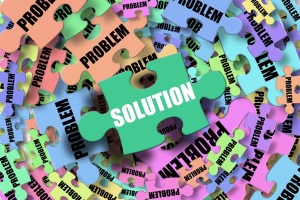Building Stronger Customer Relationships with CRM Solutions
Get Started
Call-to-action
Tel: (+234) 802 320 0801, (+234) 807 576 5799
Email: info@Stonehillresearch.com
Office Address: 5, Ishola Bello Close, Iyalla Off Street, Alausa, Ikeja, Lagos, Nigeria
Introduction
There is no how a business, no matter its size can afford to ignore customer relationship management. At its simplest, it is a method of record keeping that ensures nothing slips through the net. It could be a spreadsheet of contacts, a simple database or a tailor-made system. Whatever the size of your business or the sector you are in, there is a CRM system for you.
A good knowledge of your customers enables you to develop marketing strategies that target their specific needs and increase your sales. But how do you safely get, store and sort customer data? We look at how a customer relationship management (CRM) system can boost your revenue.
A customer relationship management system can be a powerful tool in your marketing armory. By recording your customer’s product likes and dislikes, their spending patterns and their location, age and gender, CRM software enables you to build up a detailed picture of their tastes, needs and buying habits.
This in turn enables you to segment your customer base into groups of buyers with different tastes or budgets. You can identify your most profitable customers, for example, or promising prospects, and target them with marketing messages and offers devised just for them.
Building and maintaining strong customer relationships is an art that can make or break a company’s success. A good customer relationship goes beyond simply providing a product or service; it involves creating a connection and fostering trust.
Importance of Customer Relationships in Nigeria
In Nigeria, where the economy is thriving and the population is diverse, customer relationships are vital to the growth and survival of businesses. Companies seeking to be successful in this particular environment should be able to appreciate and value the potential brought about by these relationships. Below are some of the reasons why customer relationships are critical in Nigeria:
Growing Markets
As more Nigerians embrace the Nigerian market, the level of competition in both the banking sector, the retail and the telecommunications and technology markets will only continue to increase. Companies need to position themselves by offering better services and designing individualized experiences for their clients. Loyalty to customers has been proven to ensure success in business especially in a dynamic and competition-filled environment. Customer relations help organizations to distinguish themselves and attract their target clientele.
Ethnic Diversity and Cultural Differences
With over 250 ethnic groups and several languages, Nigeria is a nation full of cultures. Such diversity affects the way consumers behave and the way they perceive products and services. Businesses that show empathy and patience to these cultural differences are able to design experiences that are very appealing to their customers. The process of establishing connections should start with trust as well as appreciating the background of the customers in order to increase their loyalty and connection to the brand.
Desire for personalization by the customers
There is a growing number of Nigerian clients who no longer want to be addressed the same way as everyone else. As the use of the internet through various media platforms has increased, most consumers are used to marketing and communication that is designed specifically for them.
CRM systems help organizations collect and study the consumer data, so they know how to adjust their products and communication. This level of customization increases customer satisfaction and maintains their loyalty for the long run.

Consumer Empowerment through Technology
Indeed, the rise in mobile devices and social media ability in Nigeria has brought power to consumers. Customers were able to tap a lot of resources and have an easy platform where they could rate their experiences. There is a need for management to focus on creating relationships in order to protect the brand and manage customer complaints. It is increasingly becoming apparent that such positive perceptions can be achieved through good practices of customer engagement and quick resolution of issues on social media.
Consequences of Trust and loyalty
In a highly competitive market where there is a lot of mistrust towards brands, trust is king. Developed relationships with customers allow us to maintain confidence in the company’s products, which is vital for retaining clientele. A customer with a strong attachment to the business is more likely to share their experience with friends, hence cutting down advertising costs and increasing referrals. A good amount of investment in customer relationship management will go a long way in trust building.
Cumulative Financial Gains
The dynamics and depth of decent relationships with customers translates to financial rewards over a long period of time. Reaching out to current customers is cheaper than going after new clients. Through focusing on customer satisfaction and loyalty, businesses are able to realize more sales, subsequent purchases and greater customer lifetime value.
As Nigeria advances its economy, these advantages are essential for supporting expansion.
Featuring Incorporation feedback for streamlining operations
Customer relationships are a source of valuable information for businesses on what consumers want. Through regular contact and feedback, companies get to know their clients well and alter their products or services as the case may be. In this interaction, there will always be new ideas, and businesses will keep pace in their development with the dynamic environment.
Community Engagement
There is a perception about businesses in Nigeria, that they belong to the people. Having strong customer relations helps in enhancing the area and encouraging people to become involved. Businesses that invest in development and care for customers can build a sound customer base and improve corporate image.
Crisis Resilience
In the event of a crisis, such as economic, social, or health, the firms with suitable suppliers and existing customers will survive the shocks. During tough economic periods, loyal clients who have had positive brand interactions will be the first to respond to brand promotions, and losses will be reduced thanks to good timing messages. CRM systems allow for quick and timely and businesses to communicate and make customers aware of things and events.
Facilitating Brand Advocacy
With proven business practices, perceiving oneself as appreciated, and wanted, raises the probability for that individual to endorse the business as a loyal brand advocate. Given the weight of consumer recommendations in the purchase decision, in Nigeria, organic brand advocacy can be a result by having good relationships with customers that becomes naturally generated. Customers with satisfaction after consuming the businesses’ goods are actively referring the business to other people which decreases the cost of marketing to acquire new clients. Nigerians are regarded as a difficult market to breach without selling your soul to the devil. A business that takes time and effort in creating customer relationships will do relatively better in the Nigerian market.
By using these integrated CRM solutions in the form of enhanced engagement and satisfaction, clients are retained, new sales occurred and market position established in the dynamic economics as it is with Nigeria. This somewhat explains why it will not matter how fast Nigeria develops in the future, building strong customer chains will always be critical.
Meaning of CRM (customer relationship management)
Customer relationship management (CRM) is the combination of practices, strategies and technologies that companies use to manage and analyze customer interactions and data throughout the customer lifecycle. The goal is to improve customer service relationships and assist with customer retention and drive sales growth.
CRM systems compile customer data across different channels and points of contact between the customer and the company. These can include the company’s website, telephone, live chat, direct mail, marketing materials and social networks. CRM systems can also give customer-facing staff detailed data on customers’ personal information, purchase history, buying preferences and concerns.
Benefits of Customer Relationship Management to Businesses
The benefits of CRM systems apply to all types of organizations, ranging from small businesses to large corporations. They include the following:
Enhanced customer service. Having customer information, such as past purchases and interaction history, easily accessible helps customer support representatives provide better and faster customer service.
Trend spotting. Collection of and access to customer data let businesses identify trends and insights about their customers through reporting and visualization features.
Automation. CRM systems can automate menial, but necessary, sales pipeline and customer support tasks.
Components of Customer Relationship Management
At the most basic level, CRM software consolidates customer information and documents it into a single CRM database. This lets business users more easily access and manage that information.
CRM features enable managers to track performance and productivity based on information logged within the system. Common components and capabilities of CRM systems include the following:
Human resources (HR) management: CRM systems help track employee information, such as contact information, performance reviews and benefits within a company. This enables the HR department to more effectively manage the internal workforce.
Analytics: CRM analytics examines user data to create targeted marketing campaigns that can increase customer satisfaction rates.
Artificial intelligence (AI): AI technologies, such as Salesforce Einstein, have been built into CRM platforms to automate repetitive tasks, identify customer-buying patterns and predict future customer behaviors.
Project management: Some CRM systems include features to help users track client project details, such as objectives, strategic alignment, processes, risk management and progress.
Integration with other software: Many systems integrate with other software, such as call center and enterprise resource planning systems.
Marketing automation: CRM tools with marketing automation capabilities automate repetitive tasks to enhance marketing efforts at different touchpoints in the lifecycle for lead generation. For example, as sales prospects come into the system, it might automatically send email marketing content with the goal of turning a sales lead into a full-fledged customer.
Sales force automation: These tools track customer interactions and automate certain business functions of the sales cycle. Sales force automation tools target sales functions where it’s necessary to follow leads, obtain new customers and build customer loyalty.
Contact center automation: Designed to reduce tedious aspects of a contact center agent’s job, contact center automation includes prerecorded audio that assists in customer problem-solving and information dissemination. Various software tools that integrate with the agent’s desktop tools can handle customer requests to cut down the length of calls and streamline customer service processes. Automated contact center tools, such as chatbots, can improve customer user experiences.
Geolocation technology, or location-based services: Some CRM systems include technology that creates geographic marketing campaigns based on customers’ physical locations, sometimes integrating with popular location-based Global Positioning System (GPS) apps. Geolocation technology is also used as a networking or contact management tool to find sales prospects based on a location.
Workflow automation: CRM systems help companies optimize business processes by streamlining mundane workloads, enabling employees to focus on high-level and creative tasks that help them close deals.
Lead management: Sales leads can be tracked through a CRM platform, enabling sales teams to input, track and analyze data for leads in one place.
Types of Customer Relationship Management
Every business should use a CRM to improve their business processes and increase revenue, but how do you know which type of CRM is right for your company?
There are 3 main types of CRM software: operational CRM systems, collaborative CRM systems, and analytical CRM systems.
While all these CRM systems are similar in some ways, they also have notable differences, and it’s important that you’re aware of these differences so that you can choose the right CRM system for your business’s specific needs.
As a business owner, it’s imperative that you prioritize your customer relationships to increase customer retention and ultimately drive sales, but that starts with choosing the right type of CRM for your business.
What CRM software Means
Customer relationship management software, or CRM software, is a type of system that businesses use to manage customer data and build stronger relationships with their customers.
Whether you have a small business with a few hundred customers or a huge enterprise with hundreds of thousands of customers, your customers should always be your number one priority. But managing all that customer data can be difficult, which is why it’s so important to have a CRM system. CRM systems can do everything from lead scoring to sales automation, so you can improve your customer interactions and service processes.
A CRM will also help improve your time management by automating various tasks, so you can focus more on building your customer relationships and making sure your customers always have a positive experience with your business.
Importance of Customer Relationship Management software
CRM software is important for countless reasons. A CRM can improve the customer experience by offering personalized customer support and helping you keep up with your customers’ ongoing needs.
CRM software is also beneficial for your sales team as it can help sales reps optimize their daily tasks and connect with more leads who are likely to become customers. In addition to your sales teams, CRM software can also benefit your marketing department.
CRM systems can help with marketing automation by collecting important customer data for you, allowing you to create more personalized experiences and effective marketing campaigns that reach your target audience.
Overall, a CRM system can benefit your business in many ways. From improving time management with marketing automation to helping you retain customers with personalized content, a CRM is beneficial across all your departments.
However, there are 3 types of customer relationship management software that you can use for your business:
Operational CRM
Collaborative CRM
Analytical CRM
Understanding the differences between these CRM types is essential so that you can make an informed decision about which type of CRM is right for your business. While all 3 types of CRM systems help with managing customer relationships, there are some key differences that you should be aware of.
Operational CRM
This type of CRM will help to simplify various business processes to ensure a positive customer experience.
An operational CRM can help you with your business operations, specifically those surrounding your customer relationships. An operational CRM system can help you throughout your entire customer lifecycle to make sure your customers’ needs are always met. The main departments that would benefit from an operational CRM system are your sales team, marketing team, and customer service departments.
There are a few main features of operational CRM that you should know: customer service automation, sales automation, and marketing automation. Automation is one of the most important features of a CRM that can improve your business functions in countless ways.
Having a system that can automate all these tasks will save your business a ton of time that you otherwise would have spent on monotonous tasks like collecting customer data and sending out emails.
The customer service automation feature will handle various tasks for you, such as reaching out to prospective customers, chatting with customers, and sending out automated responses.
The sales automation feature can help streamline your sales process by sending out scheduled emails, arranging meetings with sales reps, and overall helping you communicate directly with your customers.
The marketing automation feature will handle various marketing tasks, like managing email campaigns and calling contacts, so you can focus more on creating effective marketing campaigns. Overall, an operational CRM can help you accomplish more in less time by handling a lot of the tedious tasks that come with owning a business.
Collaborative CRM
This Software helps to unite all the different departments of your business. It type of CRM system focuses on connecting all your teams, like your marketing team, sales reps, and customer service department. This way, everyone will have access to the same information so they can provide a positive customer experience across all departments.
Collaborative CRMs also ensure that all customer data is kept up-to-date so everyone in your company can work together to accomplish the same goal.
The two main features of a collaborative CRM are interaction management and channel management. Interaction management focuses primarily on the relationship between you and your customers. This allows you to have a comprehensive view of the customer journey so you can identify exactly where improvements need to be made.
Channel management allows you to communicate with your customer on whichever channel they prefer, whether that be social media, email, or phone. Channel management is an important feature to have in your CRM system because you need to be able to effectively reach your customers on a platform that you know they use.
Analytical CRM
An analytical CRM system is beneficial for many reasons, but mainly because it can help you not only collect customer data but analyze that data so you can gain more insight into your customers.
Businesses that want to develop their marketing strategy and companies that use big data will most likely benefit from this type of CRM because of its complex analytical capabilities.
This will benefit your sales and marketing teams because they’ll have a better idea of their customer’s preferences and patterns so they can customize their strategies to appeal to them. With an analytical CRM system, you can identify key performance indicators, customer analytics, sales analytics, and more.
Analytical CRM systems have many features, but a few notable ones include data mining, customer segmentation, and Online Analytical Processing tools.
Data mining can help turn specific customer data into insights so that you can identify patterns and create customer segments based on them. Customer segmentation is another key feature of an analytical CRM which allows you to group your customers based on their data, buying behaviors, and more. Online Analytical Processing tools, or OLAP, can be used to find data and perform complex analytical calculations.
Step-by-Step Guide on How to choose the Right type of Customer Relationship Management for your Company
The right type of CRM for your company ultimately comes down to your business operations and specific needs. How one business functions might be entirely different from how other business functions and each would benefit from a different type of CRM. So, before you can go ahead and make a choice, you need to figure out what problem you’re trying to solve with a CRM and what your business’s unique goals are.
Once you’ve identified your goals, you then need to think about your budget. The price of a CRM system can vary greatly, and one with more features is inevitably going to cost more than a basic version. While a CRM can help you cut costs in the long run by increasing revenue, it can be expensive to get started with, so your budget is definitely something you’ll want to take into account.
The last thing you should think about when deciding which type of CRM is best for your business is which features you can’t live without. If you need a system that can analyze customer data and perform data mining, then an analytical CRM is right for you.
But if your main focus is improving the customer experience and increasing customer retention, then an operational CRM is probably a better choice. Think about the specific features that are non-negotiables for you and choose the CRM that offers those.
Prioritize customer relationships to improve customer retention
As a business owner, your customers should be your utmost focus. But in order to make sure their needs are being met and they’re satisfied with your products or services, you need a way to track and manage their data. Fortunately, you can do all of that, and more, with a customer retention management platform. The right type of CRM can help you prioritize your customer relationships so that you can retain more customers, and in turn, boost sales.
Choosing the right type of CRM for your business can be difficult, especially when they all have their own pros and cons.
Ultimately, the best CRM software depends on your company’s unique wants and needs, what your goals are, and what features you need to accomplish those goals. If you’re looking for a comprehensive CRM that offers all the features you need to grow and improve your business, consider Mailchimp.
Mailchimp is a marketing automation and email marketing platform that helps businesses of all sizes improve their customer relationships. With Mailchimp’s free CRM, you can connect all your contact data on one platform, understand patterns in your data, turn audience insights into action, and more.
Mailchimp’s CRM offers everything from audience tools to sales automation, so you can have a better understanding of your company’s sales process and make the right decisions to increase revenue. With Mailchimp’s customer retention strategies, you can strengthen the relationships with your current customers, and build relationships with new ones, in no time.
Types Of Customer Relationship Management Technology
The four main vendors of CRM systems are Microsoft, Oracle, Salesforce and SAP. These four tend to be the best systems for large companies; other providers are popular among small to midsize businesses. The types of CRM technology offered are as follows.
Cloud-based CRM
CRM that uses cloud computing is also known as software as a service or on-demand CRM. Data is stored on an external, remote network that employees can access anytime and anywhere there is an internet connection. Sometimes, a third-party service provider oversees system installation and maintenance. The cloud’s quick and easy deployment capabilities appeal to companies with limited technological expertise or resources.
Data security is a primary concern for companies using cloud-based systems, as the company doesn’t physically control the storage and maintenance of its data. If the cloud provider goes out of business or is acquired by another company, an enterprise’s data could be compromised or lost. Compatibility issues can also arise when data is initially migrated from a company’s internal system to the cloud.
Companies might consider cloud CRM as a cost-effective option. Vendors typically charge the user on a subscription basis and offer the option of monthly or yearly payments. However, cost might still be a concern because paying subscription fees for software can be more costly over time than investing in an on-premises model.
Popular cloud-based CRM providers include HubSpot, Salesforce, Zendesk and Zoho.
On-premises CRM
On-premises CRM puts the onus of administration, control, security and maintenance of the database and information on the company using the CRM software. With this approach, the company purchases licenses upfront, instead of buying yearly subscriptions from a cloud CRM provider. The software resides on the company’s servers, and the user assumes the cost of any upgrades. It also usually requires a prolonged installation process to fully integrate a company’s data. Companies with complex CRM needs might benefit from an on-premises deployment.
Many cloud-based providers, such as Aptean and Salesforce, also offer on-premises versions of their CRM software.
Open source CRM
An Open Source CRM system makes source code available to the public, enabling companies to make alterations at no cost to the company using the system. Open source CRM systems enable the addition and customization of data links on social media channels, assisting companies looking to improve social CRM practices.
Platforms such as Bitrix24, OroCRM, SugarCRM and SuiteCRM offer alternatives to the proprietary platforms from Salesforce, Microsoft and other vendors. Adoption of any of these CRM deployment methods depends on a company’s business needs, resources and goals, as each has different costs associated with it.
Examples CRM in practice
Examples of CRM use vary by the type and purpose of the specific CRM system. Common ones include the following.
Contact center
Traditionally, data intake practices for CRM systems have been the responsibility of salespeople and marketing departments, as well as contact center agents. Sales and marketing teams procure leads and update the system with information throughout the customer lifecycle. Contact centers gather data and revise customer history records through service calls and technical support interactions.
Social CRM
Social media in CRM involves businesses engaging with customers directly through social media platforms, such as Facebook, Twitter and LinkedIn. Social media presents an open forum for customers to share experiences with a brand, whether they’re airing grievances or promoting products.
To add value to customer engagement on social media, businesses use various social CRM tools that monitor social media conversations. These tools look for everything from specific mentions of a brand to the frequency of keywords used to determine a company’s target audiences and which platforms they use. Other tools are designed to analyze social media feedback and address customer queries and issues.
Companies are interested in capturing customer sentiments, such as the likelihood they recommend products and overall customer satisfaction to develop marketing and service strategies. Companies try to integrate social CRM data with other customer data obtained from sales and marketing departments to get a single view of the customer.
Another way in which social CRM adds value for companies and customers is through customer communities, where customers post reviews of products and engage with other customers to troubleshoot issues and research products in real time. Customer communities provide low-level customer service for certain kinds of problems and reduce the number of contact center calls. These communities also provide new product ideas and feedback that companies can use in lieu of focus groups.
Mobile CRM
CRM applications built for smartphones and tablets have become a must-have for sales representatives and marketing professionals who want to access customer information and perform tasks when they aren’t physically in their offices. Mobile CRM apps take advantage of features that are unique to mobile devices, such as GPS and voice recognition capabilities, to give sales and marketing employees access to customer information from anywhere.
Business-to-business practices
A CRM system in a business-to-business (B2B) environment helps monitor sales as they move through the sales funnel, enabling a business to address any issues that might come up during the process. CRM strategies in the B2B market give sales reps more visibility into leads, increasing efficiency throughout the sales process.
Challenges of Customer Relationship Management
For all the advancements in CRM technology, without the proper management, a CRM system can become little more than a glorified database in which customer information is stored. Data sets must be connected, distributed and organized so that users can easily access the information they need.
Companies might struggle to achieve a single view of the customer if their data sets aren’t connected and organized in a single dashboard or interface. Challenges tracking the customer journey also arise when systems contain duplicate customer data or outdated information. These problems can lead to a decline in customer experience (CX) because of issues such as long wait times during phone calls and improper handling of technical support cases.
CRM systems work best when companies clean their existing customer data to eliminate duplicate and incomplete records before they supplement CRM data with external sources of information.
CRM and AI
CRM systems benefit from nascent trends and technologies in the AI space. Sales forecasting is one area that will benefit. Predictive AI algorithms in a CRM system can analyze historical data about customers and companies to predict future sales outcomes and future market trends to shape an organization’s decision-making.
AI also provides automation for routine and repetitive tasks, such as data entry and follow-up emails to customers or potential customers. Advanced chatbots and sentiment analysis capabilities help synthesize information from interactions to better identify customer needs and inform future interactions.
HubSpot and Salesforce are examples of enterprise-grade CRM providers that are integrating up-to-date AI capabilities into their platforms. It remains to be seen how quickly smaller organizations and startups with CRM offerings and significantly less resources will be able to integrate similar AI features. Still, these AI enhancements will become more commonplace in the future.
CRM tools are required to manage customer data, but it also helps for businesses to have a strategy that prioritizes CX.
Conclusion
Today, establishing customer loyalty is one of the most critical factors for success for businesses operating in Nigeria. The country is rapidly growing and adopting new technological advancements, and so it is never too late to adopt CRM solutions that aim to improve customer relations, satisfaction, retention and loyalty.
It is important to appreciate the vast demographics of Nigeria and the ever-changing consumer patterns. Organizations can leverage on the customer relationship management (CRM) data to develop a company which customers can trust with their business through tailor-made interactions that will ensure customer loyalty. In turn, responding to and addressing their customers’ needs and issues through digital means while respecting and appreciating cultural differences will be necessary for brand interplay.
There are hurdles such as, infrastructural constraints and differences in levels of computer literacy but these can be overcome through clever ideas and strategic execution. It is worth noting that, organizations that embrace effective CRM systems will not only maintain good relations with their clients but also expand their services as well as raking in profits.
Many businesses are guaranteed to succeed as the market shifts if they change and jump to understanding their customers first. Businesses in Nigeria can think of CRM not simply as a tool but an all-embracing strategy for interaction/dialogue with the consumers, creating opportunities for enhanced relationships. The objective of many businesses should be to acquire customers and build and manage the relationships as this is what will drive businesses forward in this era and in the Nigerian market.
Call-to-Action
Tel: (+234) 802 320 0801, (+234) 807 576 5799
Email: info@stonehillresearch.com
Office Address: 5, Ishola Bello Close, Iyalla Off Street, Alausa, Ikeja, Lagos, Nigeria
Inquiry Contact Form









There are no comments